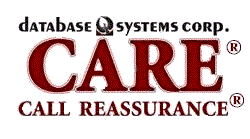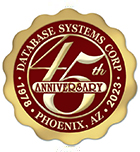|
|



CARE Volunteers
 CARE (Call Reassurance) programs call the elderly and homebound residents to ensure they are OK. Although this computerized phone system requires no volunteers to call the CARE recipients, human contact can be both assuring and welcome by these seniors.
CARE (Call Reassurance) programs call the elderly and homebound residents to ensure they are OK. Although this computerized phone system requires no volunteers to call the CARE recipients, human contact can be both assuring and welcome by these seniors.
There are several national programs such as Faith in Action and Senior Corp. RSVP that provide volunteer telephone reassurance programs. For a state by state listing of some of these groups, visit our CARE providers webpage.
Volunteer based programs such as these provide valuable community services that incorporate both telephone reassurance and friendly conversation with seniors.
Contact DSC to learn more about our CARE phone systems and volunteer opportunities.
CARE and Volunteer Organizations
Senior volunteer organizations, combined with a CARE phone system, can provide the best program for ensuring the well-being of seniors.
CARE calls seniors on regular basis. This ensures that the basic function of telephone reassurance is provided each day and in the same, consistent manner.
Quality control reports are provided to ensure that the seniors are being called and that the calls are being properly handled by the responsible organization.
The senior volunteers can provide the followup as well as the friendly communications that provide comfort and friendship to the call recipient.
Here is how CARE and volunteers can work together to assist a senior's needs.
- CARE Places Initial Call - CARE is designed to automatically call a senior to ensure that they are OK. If the call is answered, the senior can request non-emergency assistance or simply ask to chat with someone.
- Volunteer Response - Some volunteer organizations are the first responders if a senior does not acknowledge the CARE call. This might simply be a followup call or a visit to the senior's home. If necessary, the volunteer can call the police or emergency services.
- Volunteer Chat - If the senior requests non-emergency assistance or simply wants to talk, the volunteer can be notified by email or by a phone call to contact the senior.
In the above scenario, CARE ensures the well-being of the senior while the volunteers perform the followup and provide a human touch to this process.
There are just times when a friendly voice can provide comfort, assistance or advice and the CARE volunteers can perform this task is a warm and loving manner.
How Can A CARE Volunteer Help?
The CARE phone system is designed to allow family members or friends function as the first level of contact whenever a CARE recipient does not respond to an automatic call.
 If there are no family or friends available, the police or fire departments within the community are usually assigned the next level of contact.
If there are no family or friends available, the police or fire departments within the community are usually assigned the next level of contact.
CARE volunteers can be assigned to individuals who have no one to contact whenever there is no response.
The CARE system also gives the option for the CARE recipient to talk with a friend or a family member in a non emergency situation. CARE volunteers can also be assigned to individual CARE recipients for this type of friendly conversation.
In summary, the combination of both CARE automation and volunteer staff can ensure the following:
- Volunteers can still be involved talking to seniors - to any degree
they choose. CARE, at the very least, can simply make the entire
objective more organized - especially since it has 11 reports
included. It also reduces the amount of mundane dialing of phone
numbers by volunteers.
- CARE makes volunteers more efficient since the CARE system calls
seniors and notifies volunteers of only those seniors wanting friendly
chat. (Notification comes in form of calls or e-mails). Therefore,
volunteers never have to call seniors who do not want to chat today.
- Volunteers should have more time to provide other valuable services
to this same organization. (Is there ever shortage of volunteer
work!!)
- Finally, CARE works 24/7/365 including holidays, snow days, and
rarely gets sick. Therefore, regardless of volunteer dependability or
lack there of, the primary objective of checking on the well being of
seniors 7 days per week, every week, will always be met.
The Oxford Park Commission and R.S.V.P.

"RSVP volunteers provide hundreds of community services, ranging from tutoring children, museums, Meals-On-Wheels, nursing homes, income tax assistance, transportation, Triad (seniors and law enforcement working together) and many more stations." - www.oxfordparkcommission.com
The Oxford Park Commission and R.S.V.P. use our CARE (Call Reassurance) phone system to provide its senior citizens with a telephone reassurance service. Citizens can be called daily to ensure their well-being.
This system replaced their obsolete RUOK® system.
|
|
CARE Volunteer Pool
Besides volunteering to help individual CARE recipients, a CARE volunteer can also be assigned to a pool of individuals who will be contacted in the event that the senior does not respond or if the CARE recipient wishes to speak to someone.
CARE volunteers can identify the days of the week and the times when they would like to volunteer for this service. The CARE phone system will call the volunteer's number and provide the CARE recipient's information or can even connect the volunteer with the senior directly. If the volunteer is not available or cannot perform the task, another volunteer will automatically be called.
Telephone Reassurance Features and Demonstration
Our CARE telephone reassurance program can be managed online. The following is an example of how to use this system.
This demonstration shows how CARE recipients are added to our system for calling and how a CARE system administrator can monitor the ongoing operation of our phone reassurance system.
To view this demonstration, click the graphic above.
Telecare Information
Contact DSC to learn more about our telecare phone reassurance services and phone systems.
|
|




 CARE (Call Reassurance) programs call the elderly and homebound residents to ensure they are OK. Although this computerized phone system requires no volunteers to call the CARE recipients, human contact can be both assuring and welcome by these seniors.
CARE (Call Reassurance) programs call the elderly and homebound residents to ensure they are OK. Although this computerized phone system requires no volunteers to call the CARE recipients, human contact can be both assuring and welcome by these seniors.
 If there are no family or friends available, the police or fire departments within the community are usually assigned the next level of contact.
If there are no family or friends available, the police or fire departments within the community are usually assigned the next level of contact.

